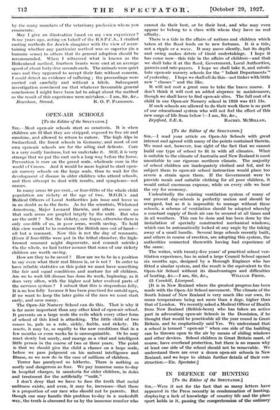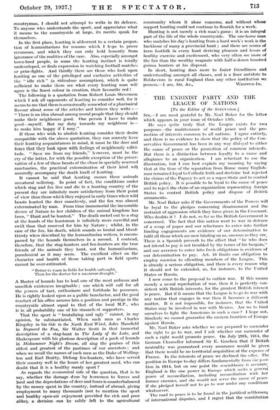IN DEFENCE OF HUNTING [To the Editor of the SPECTATOR.]
Smn,—Were it not fbr the fact that no many letters have appeared in the Press recently in condemnation of hunting, displaying a lack of knowledge of country life and the place sport holds in it, passing the comprehension of the'orglinnry
countryman, I should not attempt to write in its defence. To anyone who understands the sport, and appreciates what it means to the countryside at large, its merits speak for themselves.
In the first place, hunting is abhorrent to a certain propor- tion of humanitarians for reasons which I hope to prove erroneous, and which they can only hold honestly from ignorance of the realities of the case. Also, especially amongst town-bred' people, in some the hunting instinct is totally undeveloped, or finds expression in watching football matches or prize-fights. And thirdly there are those who look upon hunting as one of the privileged and exclusive activities of the " idle rich " (a ridiculous assumption), which is quite sufficient to make them see what every hunting man will agree is the finest colour in creation, their favourite red I
The following is a quotation from Robert Louis Stevenson which I ask all opponents of hunting to consider well, for it
seems to me that there is occasionally somewhat of a pharisaical flavour about some of the articles and letters they write :— " 'I here is an idea abroad among moral people that they should make their neighbours good. One person I have to make good—myself. But my duty towards my neighbour is— to make him happy if I may."
If those who wish to abolish hunting consider their desire compatible with the above quotation, they can scarcely have their hunting acquaintances in mind, it must be the deer and
foxes that they look upon with feelings of neighbourly solici- tude. " Save me from my friends," however, must be the
cry of the latter, for with the possible exception of the preser- vation of a few of these beasts of the chase in specially reserved sanctuaries, the practical extermination of their kind will assuredly accompany the death knell of hunting.
It cannot be said that hunting causes these animals unnatural suffering. In point of fact, the conditions under which stag and fox live and die in a hunting country of the present day are infinitely more satisfactory from their point of view than those which they enjoyed in early times when wild beasts hunted the deer ceaselessly, and the fox was almost exterminated by man. From time immemorial the inexorable decree of Nature to her children of the animal kingdom has been, " Hunt and be hunted." The death meted out to a stag at the hands of the huntsman is infinitely more merciful and swift than that reserved for him by Nature ; whilst, in the case of the fox, his death, which sounds so brutal and blood- thirsty when described by the humanitarian writers, is encom- passed by the hounds themselves in a second. I contend, therefore, that the stag-hunters and fox-hunters are the true friends of the animals they hunt, not the humanitarians, paradoxical as it may seem. The excellent effect on the character and health of those taking part in field sports cannot be over-estimated.
" Better to roam in fields for health unbought, Than fee the doctor for a nauseous draught."
A Master of hounds has to lead one of the most arduous and unselfish existences imaginable ; one which will call for all the powers of tact, enthusiasm and fortitude he possesses. He is rightly looked upon as a public benefactor, and the good conduct of his office assures him a position and prestige in the countryside almost equal to that of the local M.P., who is in all probability one of his staunchest supporters.
That the sport is " brutalizing and ugly " cannot, in my opinion, be substantiated. When such men as Charles Kingsley in his Ode to the North East Wind, John Masefield in Reynard the Foz, Sir Walter Scott in that immortal description of a stag-hunt in The Lady of the Lake, and Shakespeare with his glorious description of a pack of hounds in Midsummer Night's Dream, all sing the praises of this oldest and greatest of the pastimes of our ancestors ; and when we recall the names of such men as the Duke of Welling- ton and Earl Beatty, lifelong fox-hunters, who have served their country well in the hours of her greatest need, who can doubt that it is a healthy manly sport ?
As regards the economical side of the question, that is to say, whether the damage done 'by horsemen to fences and land and the depredations of deer and foxes is counterbalanced by the money spent in the country, instead of abroad, giving employment to many thousands (not to mention the sport and healthy open-air enjoyment provided for rich and poor alike), a- decision .can he safely _left to the agricultural community whom it alone concerns, and without whose support hunting could not continue to flourish for a week.
Hunting is not merely a rich man's game ; it is an integral part of the life of the whole countryside. The one-horse man who snatches his day's hunting from a hard week's work is the backbone of many a provincial hunt ; and there are scores of keen footfolk in every hunt deriving pleasure and hours of healthy .exercise and excitement, who very often see more of the fun than the wealthy magnate with half-a-dozen hundred guinea hunters at his disposal. .
In short, hunting does more to foster friendliness and understanding amongst all classes, and is a finer antidote to Bolshevism in rural England than any other institution we



























































 Previous page
Previous page